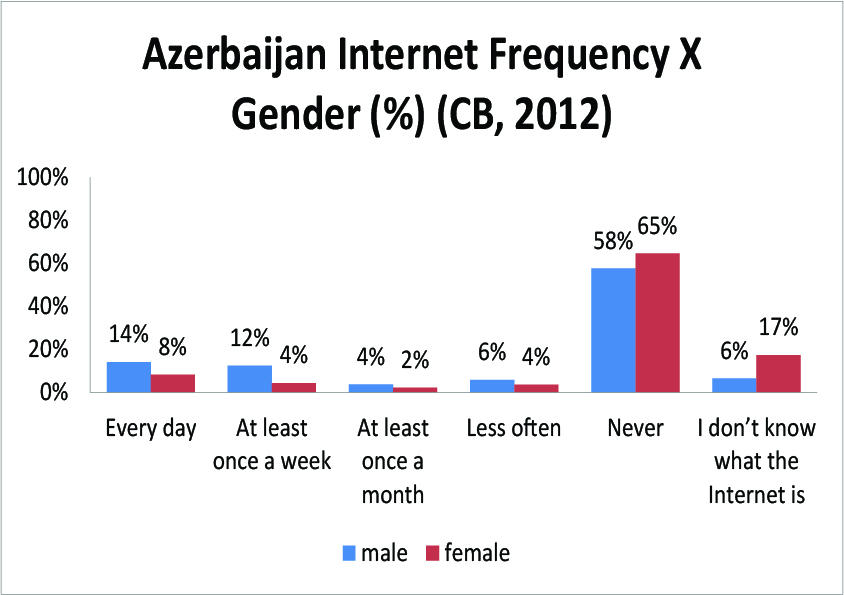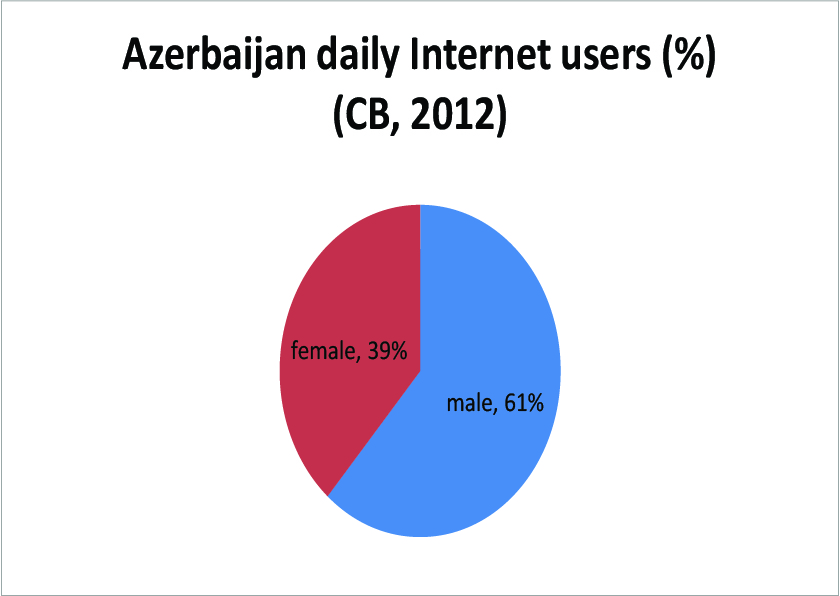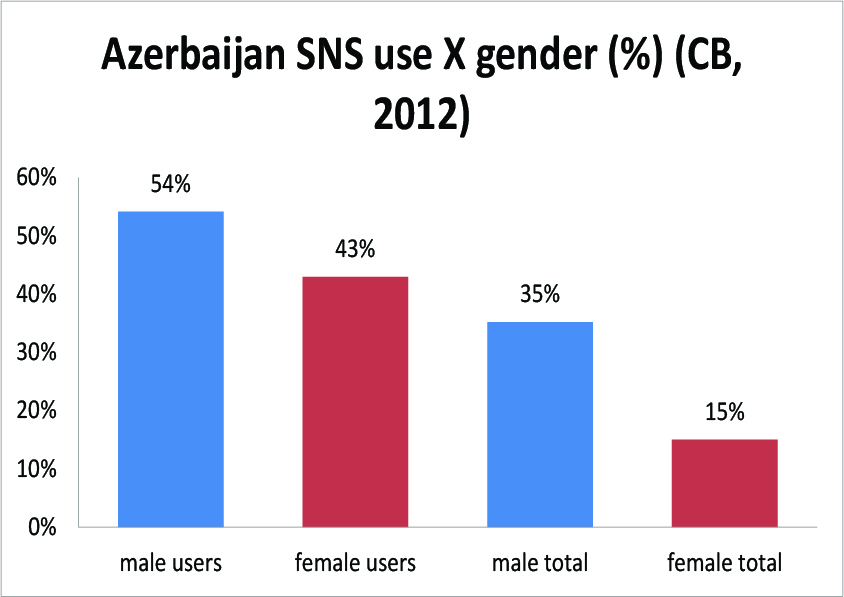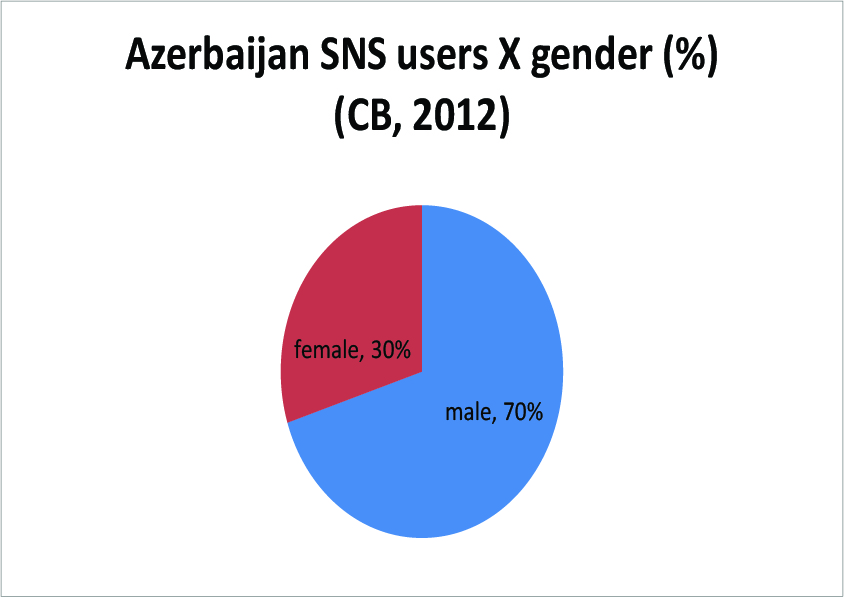Monthly Archives: March 2013
#protestbaku got interesting again
I’ve been collecting the tweets for #protestbaku but things haven’t been interesting in awhile. But let’s look at this analysis from March 8 at 5am.
I don’t really get these clusters.
Groups 1 and 2 tweet in Azerbaijani mostly. And somehow I am in group 2. I am not sure what the differences between groups 1 and 2 are.
Group 3 is a mix of foreigners and locals, an English and Azerbaijani.
But this weekend is a new protest, so the hashtag should liven up. Maybe this is a good pre-protest sense of what is happening.
Azerbaijan Gender Issues Online
In honor (?) of March 8, a blog post on gender…
Last year I did quite a bit of work on gender and Internet in Azerbaijan. Here are two blog posts [1] [2]. Like in 2011, in 2012, there are almost no gender differences in Armenia or Georgia, so there is no need to write about it.
First, looking at frequency.
While 14% of Azerbaijani men are online every day, only 8% of women are. While 58% of Azerbaijani men never go online (even though they are aware of the Internet), 65% of Azerbaijani women never go online (although they are aware of the Internet), and 17% of Azerbaijani women and only 6% of Azerbaijani men do not know what the Internet is.
61% of daily Internet users in Azerbaijan are men. Last year this was 73% to 27%, so this is an improvement in equality.
54% of male Internet users in Azerbaijan are on a social networking site and 43% of female Internet users in Azerbaijan are on a social networking site. However, because of the low percentage of women online, only 15% of all female Azerbaijanis are on a social networking site, while 35% of all male Azerbaijanis are.
Men make up 70% of social networking site users in Azerbaijan in 2012. In 2011, men were 72% of Facebook users in Azerbaijan, so this is not a major change.
Protest attitudes in the Caucasus
Attitudes toward protest is one of my favorite Caucasus Barometer questions.
(Sarah Kendzior and I wrote a piece centered around this measure in 2012).
It is an interesting way to ask a question in a vignette format.
People are asked which statement they agree with and degree.
* Very much agree: People should participate in protest actions against the government, as this shows the government that the people are in charge.
* Agree: People should participate in protest actions against the government, as this shows the government that the people are in charge.
* Neither
* Agree: People should not participate in protest actions against the government, as it threatens stability in our country.
* Very much agree: People should not participate in protest actions against the government, as it threatens stability in our country.
* Don’t know
And with all of the exciting events in the Caucasus recently I was curious as to how people feel. And the analysis did not disappoint.
The collapsed analysis is a bit easier to follow. Two-thirds of Armenians think that it is okay to protest. 20% think it is not okay.
In Georgia, a little over half think that it is okay to protest, 17% think it is not okay.
And then Azerbaijan – 29% think it is okay and 43% do not think that it is okay.

And non-collapsed is here.

What are Armenians, Azerbaijanis, and Georgians doing online?
This demonstrates the percent of Internet users and percent from the total adult population that are engaging in particular online activities. To see more on general Internet, check this out.
This year there was no separation of Facebook and Odnoklassniki. I am under the impression, however, that Facebook has sort of taken over.

Music and videos seem to be especially popular in Azerbaijan.
Most Georgian Internet users are on a social networking site.
Armenian election attitudes
There was an election in Armenia, you may have heard.
The Caucasus Barometer asked people in November 2012 a number of questions, including some feelings about government and voting.
(Here’s some 2010 analysis on elections for comparison.)
Most Armenians voted in the last election.

And people weren’t sure if it was fair.

And most Armenians said that they’d vote in the presidential election.

What do Armenians think is the biggest problem? Mostly unemployment.

And trust in institutions, where there is low trust in political parties and the court system.

Fairness is an issue, as most Armenians don’t think that their government treats citizens fairly.

And what about protests? Most Armenians think that people should be allowed to protest against the government.

2012 Caucasus Technology Infographic
Everyone loves an infographic! This is based on the 2012 Caucasus Barometer.
And here is 2012!
Facebookistan.am, Facebookistan.az, Facebookistan.ge in 2012
This is an update to this post about 2011. 2012 overall Internet use here.
All data is from the Caucasus Barometer.
We know that a larger percentage of Armenians (52%) and Georgians (43%) are online than Azerbaijanis (27%) and weekly or more often adult Internet users are 43% of Armenians, 33% of Georgians, and 19% of Azerbaijanis.
Armenia has 3,100,236 people, Azerbaijan 9,168,000 people, and Georgia 4,486,000 people – but that’s total population, we need to look at just adults (since that’s the data we have about Internet use – I fully acknowledge that teenagers are online and may be using social media). According to the World Bank, 20% of Armenians, 21% of Azerbaijanis, and 17% of Georgians are ages 0-14.
So, let’s take them out of the equation – (that’s 620,047 Armenians, 1,925,280 Azerbaijanis, and 762,620 Georgians) – and you have “adult” populations of 2,480,189 AM, 7,242,720 AZ, and 3,723,380 GE. So raw weekly or daily Internet users would be:
744,057 in 2011 and 1,289,698 in 2012 Armenia
941,554 in 2011 and 1,376,117 in 2012 Azerbaijan
1,042,546 in 2011 and 1,228,715 in 2012 Georgia
Thus in 2012, there are about 1.2-1.4 million weekly or daily Internet users in each country, with Azerbaijan having the most in raw numbers, despite the lowest percentage.
In 2011, 6% of Armenians, 7% of Azerbaijanis, and 9% of Georgians (ADULTS) were on Facebook (let’s leave Odnoklassniki out of this for now). In 2012, 27% of Armenians, 13% of Azerbaijanis, and 30% of Georgians were on a social networking site.
Raw numbers then would be:
148,811 in 2011 and 669,651 in 2012 in Armenia
506,990 in 2011 and 941,554 in 2012 in Azerbaijan
335,104 in 2011 and 1,117,014 in 2012 in Georgia
—
Socialbakers.com is a website that gives Facebook statistics. I’m not very comfortable using it because of its lack of transparency and because we don’t know where they get any of their data, but let’s see what they say.
ARMENIA
Total Facebook Users 395340 — I have 669,651 adults, so this seems off (although Odnoklassniki could be a factor)
Position in the list 112
Penetration of population 13.32% — I have 27% of adults
Penetration of online population 29.06% — I have 53% of adults
AZERBAIJAN
Total Facebook Users 1013080 — I have 941,554 adults, so this seems reasonable
Position in the list 82
Penetration of population 12.20% — I have 13% of adults, so this seems a little low for total population
Penetration of online population 23.97% — I have 50% of adults, so this seems really off
GEORGIA
Total Facebook Users 969840 — 1,117,014 adults, so this seems fairly close
Position in the list 85
Penetration of population 20.95% — I have 30% of adults, so this is off
Penetration of online population 82.84% — I have 70% of adults, so this seems okay
In the future I’ll look at socialbaker’s gender and age breakdown and see if it matches with what comes from the Caucasus Barometer.
—
(This is a copy and paste from what I wrote about 2011, but I wrote it in winter 2012.)
Okay, so back to my original point — I’ve noticed that the Azerbaijani Facebook and Twitter worlds is substantially more active than the Armenian one. (I acknowledge that I’m not up on what is going on in Georgia, but for reasons explained below, you’ll see that it is probably similar to Armenia). Why is this?
1. The raw numbers noted above — a lot more Azerbaijanis are on Facebook than Armenians. (I’m going to leave these countries’ diasporas out of this, but for what it’s worth, I feel like the Azerbaijani diaspora engages with Republic of Azerbaijan citizens more than Armenian diaspora do with Republic of Armenia citizens).
2. Because of the lack of free expression and assembly in Azerbaijan, most political discussion takes place on Facebook. Armenians can do this fairly freely in cafes or homes. Similarly, Armenians can organize and be political active in ways that Azerbaijanis cannot.
3. Language is a big part of this. As I wrote before, users of the Azerbaijani language are at a serious advantage over users of Armenian or Georgian because Azerbaijani uses the Latin script. This is also a special concern when it comes to Twitter and even more so when it comes to mobile phones (only the most recent Android OS has Armenian and Georgian, iPhone has it, but the others? No way). But my overall point is that there are barriers to Armenians and Georgians using these sites.
4. This is entirely speculative, but I get the sense that Bakuvians are just way more wired than Yerevantsis are. The Baku social media scene, beyond politics, is always jumpin’! There are a ton of Azerbaijani Instagrammers, Pinteresters, and other social media platform users. I just don’t see that same sort of scene in Yerevan. Yes, there is a bit of a FourSquare scene and of course people use these social media sites, but not to the extent that I see in Azerbaijan. (Although this may be a result of the sheer numbers!!)
I’m sure there are other reasons, and I’d love to hear comments…











